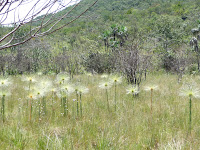Today, Liberato and I presented the final day in our three-day workshop series on Cooperative Learning Strategies.
Over the three days, we had participants from Liberato's school, IFG, and those of neighboring schools and even university students. The series was advertised via word of mouth of teachers, Liberato, and myself as we have toured and met people and also with the radio interview that we gave earlier in the week. We were pleased with the turnout and with the interest of the participants.
The use of cooperative learning strategies is uncommon here in Uruaçu and possibly in all of Brazil, many of the teachers have a general knowledge of the concept, but did not have any context for the applied experience. So I created learning models using the participants themselves as students; then shared practical application tips along with the basic theory behind the strategies. I included assessments that would work with these strategies, putting many of them into practice, again with the participants. Liberato and I created and used dual-language handouts and visuals. And we slowly and carefully answered the many questions--all through my team-teacher and translator, Liberato.
(a quick word on Liberato: he is an incredible translator. His own interest in the subject--and in fact his natural curiosity and passion for teaching--made things so easy for me. It was almost as if he could read my mind. I even came to know that if I was struggling for words, he could help me fill in the gaps. I am lucky!)
 |
| Liberato explaining a concept to the workshop participants |
 |
| Star particpants |
The Workshop could not have gone better. I am so energized by the discussions, questions, and accomplishments of the participants. On a school visit, I met with Talma, who had just that morning tried a Cooperative Learning Strategy taught in day two of the workshop. The joy on her face while she expressed her success was the best reward I could have asked for. She even gave a testimony on the final day of the workshop. This was so important because some participants were thinking that the strategies might only work in the USA.
I modeled 14 different learning strategies focused around the jig saw cooperative learning method. Over the three days, we shared ideas and questions about making such strategies work and when. We also talked about pacing and how to weave this non-traditional method with the more traditional lecture model widely used in this city.
When the participants had all departed and we were cleaning up and packing up the many materials, I did a happy dance and gave Liberato a high-five. The experience was amazing.
A quick note, I have been code-switching so much my brain is tired. I try to follow what everyone is saying, matching the vocabulary with slight adjustments for spelling and pronunciation differences with my limited knowledge of Spanish. My brain is in a constant state of overdrive (trying to follow Portuguese, trying to guess what others are attempting to say in English, thinking of ways to phrase answers using the most basic English, and attempting my own efforts to speak in Portuguese).
Now that the Workshops are finished, I can relax a bit and enjoy the new friends that I am making in between the many visits to local schools.













































